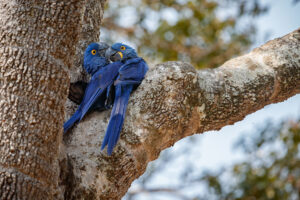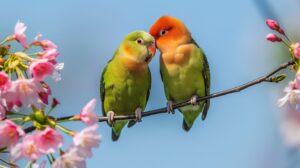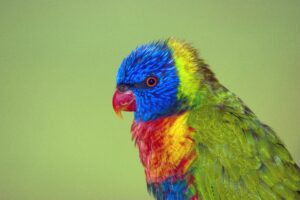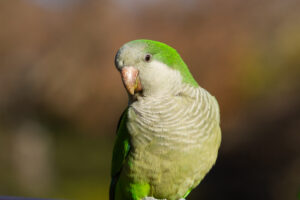Introduction
If you’ve invested in an African Grey parrot with hopes of conversational companionship, you might be wondering why your feathered friend isn’t living up to their reputation as the best talking birds in the avian world. The African Grey parrot talking ability is legendary – these birds are renowned for their exceptional vocal skills and impressive vocabulary. But what happens when your African Grey parrot isn’t talking as expected?
Many new owners become concerned when their African Grey parrot’s speech development seems delayed or non-existent. You may have watched countless African Grey parrot talking videos online, showing these intelligent birds mimicking human voices with remarkable clarity, only to find your own pet remaining stubbornly silent.
This comprehensive guide will explore the four most surprising reasons why your African Grey parrot might not be talking, and provide practical solutions to encourage your bird’s communication skills. We’ll delve into everything from the talking ability of African Grey parrots to effective African Grey talking training techniques that can transform your quiet companion into a chatty friend.
The African Grey parrot’s intelligence in talking is unmatched in the avian world, but several factors can inhibit their natural desire to communicate. By understanding these barriers, you can create the optimal environment for your African Grey parrot vocabulary to flourish.
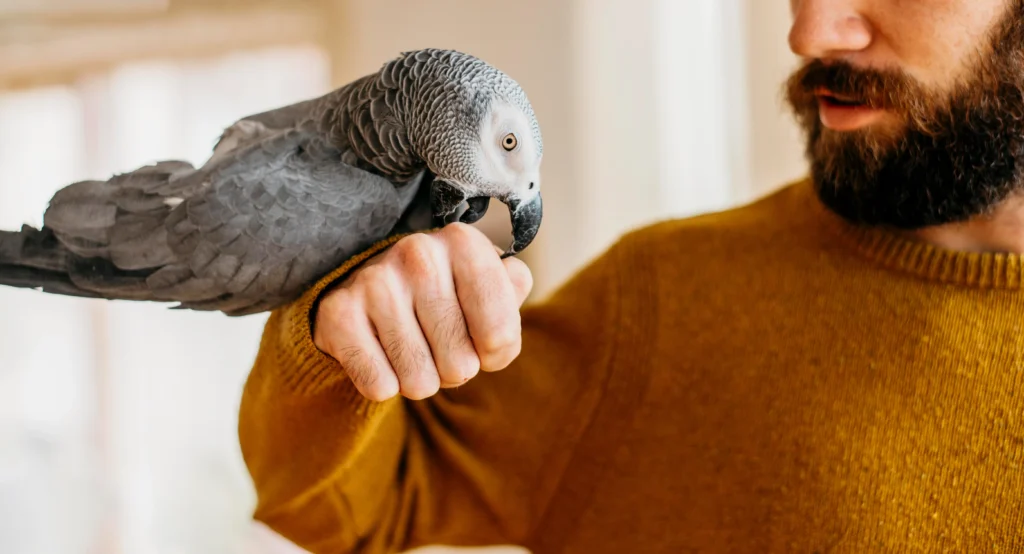
Understanding the African Grey’s Talking Potential
Before we dive into why your African Grey parrot isn’t talking, let’s establish what you can realistically expect. The question “do African Grey parrots talk?” has a resounding answer: yes, they absolutely do. In fact, they’re considered the most proficient talkers in the parrot family.
The African Grey parrot’s speech capabilities are truly remarkable. These birds don’t just mimic sounds; they can associate words with meanings and use them in context. Research has shown that the best talking African Grey parrots can learn hundreds of words and phrases, with some exceptional birds mastering vocabularies of over 1,000 words.
When comparing the African Grey talking vs Amazon parrot or other species, African Greys consistently demonstrate superior linguistic abilities. Their capacity to mimic human voice patterns is uncanny, often replicating not just the words but the exact tone and inflection of their human companions.
The talking ability of African Grey parrots stems from their extraordinary intelligence. These birds possess cognitive abilities comparable to that of a 5-year-old human child. They can understand concepts, solve problems, and even demonstrate emotional intelligence – all qualities that contribute to their impressive speaking abilities.
How much can African Grey parrot talk? While individual birds vary, most well-trained African Greys develop vocabularies of 50-100 words and phrases, with some exceptional birds learning many more. Their African Grey parrot speech clarity is often superior to other talking birds, making their vocalizations easily understandable.
African Grey parrot communication extends beyond mere mimicry. These birds use language functionally, sometimes creating novel word combinations to express their desires or observations. This sophisticated African Grey parrot language capacity is what makes them such fascinating companions.
Reason 1: Age and Developmental Factors
One of the most common reasons for a silent African Grey parrot is simply age. Many owners have unrealistic expectations about when their birds should start talking. African Grey parrot speech development follows a timeline that requires patience.
Typically, African Grey parrots begin talking between 12-18 months of age. However, some birds may not start vocalizing clearly until they’re 2-3 years old. If you have a young African Grey baby talking isn’t something you should expect immediately. Their vocal abilities develop gradually as they mature.
The African Grey parrot talking timeline looks approximately like this:
- 3-6 months: Basic sounds and whistles
- 6-12 months: Beginning to mimic simple sounds and words
- 12-18 months: First recognizable words
- 18-24 months: Expanding vocabulary
- 2-3 years: Increasing clarity and context-appropriate usage
- 3+ years: Refined speech and potential for complex phrases
Remember that each bird is unique. Some African Grey parrots may begin talking earlier, while others take longer to develop their speech. The key is patience and consistent training.
Young African Greys are like children – they need time to observe, process, and practice language before becoming proficient. During this developmental period, your African Grey parrot talking training should focus on repetition and positive reinforcement rather than expecting immediate results.
If you recently acquired an adult African Grey that isn’t talking, there may be other factors at play. Adult birds who haven’t been exposed to human speech during their critical developmental period may take longer to begin talking or might never become prolific speakers.
Reason 2: Environmental Stress and Insecurity
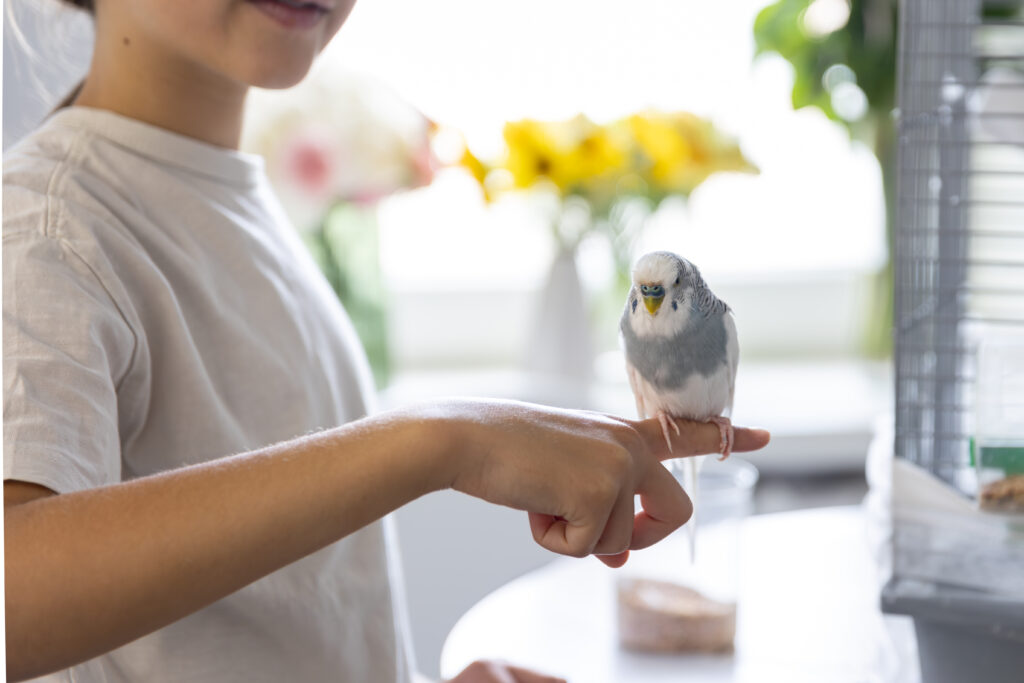
Perhaps the most shocking reason your African Grey parrot isn’t talking relates to their emotional state. African Grey parrots are highly sensitive creatures that require a stable, secure environment to thrive and express themselves verbally.
Stress is a major inhibitor of African Grey parrot communication. When these intelligent birds feel anxious or threatened, they typically shut down socially, including ceasing to talk. Common stressors include:
- Frequent household changes or moves
- Loud noises or chaotic environments
- Presence of perceived predators (even pets like cats or dogs)
- Inconsistent daily routines
- Insufficient sleep or rest periods
- Inadequate nutrition
- Limited social interaction
- Feeling exposed or vulnerable in their cage placement
African Grey parrots require approximately 10-12 hours of uninterrupted sleep each night. Sleep deprivation can significantly impact their talking ability and willingness to communicate. Ensure your bird’s cage is covered at night and placed in a quiet location.
Cage placement itself can dramatically affect your African Grey’s talking confidence. These birds need to feel secure in their territory. A cage positioned against a wall (rather than in the middle of a room) provides the security many African Greys need to feel comfortable vocalizing.
Social dynamics also play a crucial role in why African Greys talk. These birds are naturally social creatures that form strong bonds with their flock members – in captivity, that’s you. If your African Grey doesn’t feel bonded to you or spends too much time alone, they may see little reason to engage in human speech.
Temperature fluctuations can also stress your bird and inhibit talking. African Greys thrive in stable environments with temperatures between 65-80°F (18-27°C). Exposure to drafts, air conditioning vents, or heating elements can create stress that suppresses their natural vocalization tendencies.
Reason 3: Inadequate Training Approaches
Many owners underestimate the importance of proper African Grey talking training techniques. Simply having an African Grey parrot doesn’t guarantee it will talk – consistent, appropriate training is essential for developing their speaking abilities.
One common mistake is inconsistent training. African Greys thrive on routine and repetition. Teaching your African Grey parrot to talk requires daily practice sessions, ideally at the same times each day. Sporadic attempts won’t yield the results you’re hoping for.
Another critical error is negative reinforcement. Yelling at or punishing your African Grey for not talking (or for making undesirable sounds) creates fear and anxiety that further inhibits speech development. The key to successful African Grey parrot vocabulary building is positive reinforcement – praising and rewarding desired vocalizations.
Training sessions should be short (5-15 minutes) but frequent (several times daily). Long sessions can overwhelm your bird and reduce their enthusiasm for learning. Keep training positive and end sessions before your bird loses interest.
Word selection matters too. Begin with simple, one-syllable words that have meaning to your bird, such as “hello,” “good,” or the bird’s name. Words with hard consonants like “p,” “b,” and “k” are typically easier for African Grey parrots to pronounce than softer sounds.
Proper timing of reinforcement is crucial. Reward your bird immediately after they attempt to mimic a word or phrase. Even if their first attempts aren’t perfect, reinforcing their efforts encourages continued practice and improvement.
Context matters in teaching your African Grey parrot speech. Birds learn best when words are associated with specific activities or objects. For example, saying “apple” each time you offer this fruit helps your bird connect the sound with the item.
Many owners make the mistake of inconsistent pronunciation. African Greys are precise mimics – if you pronounce a word differently each time, your bird will struggle to learn it correctly. Maintain consistent tone, volume, and pronunciation during training sessions.
Reason 4: Physical Health Issues
Perhaps the most overlooked reason for an African Grey parrot’s silence is their physical health. Various medical conditions can impact your bird’s ability or willingness to talk.
Nutritional deficiencies are particularly common culprits. African Grey parrots require a diverse, nutrient-rich diet to maintain optimal vocal health. Deficiencies in vitamin A, vitamin E, calcium, and certain proteins can affect vocal cord function and overall energy levels.
A high-quality pelleted diet supplemented with fresh fruits, vegetables, and occasional nuts should form the foundation of your African Grey’s nutrition. Simply feeding seeds – a common mistake – can lead to malnutrition that affects talking ability.
Respiratory infections can dramatically impact your African Grey parrot’s speech. Signs of respiratory issues include:
- Tail bobbing when breathing
- Wheezing or clicking sounds
- Nasal discharge
- Decreased appetite
- Lethargy
- Voice changes or reluctance to vocalize
If you notice these symptoms, consult an avian veterinarian immediately. Respiratory infections require prompt treatment to prevent permanent damage to your bird’s vocal apparatus.
Zinc toxicity, often from ingesting metal parts of cages or toys, can cause neurological symptoms that affect speech. African Greys should only have access to bird-safe, zinc-free toys and accessories.
Age-related changes can also affect talking ability. Senior African Greys may experience vocal changes similar to elderly humans. Birds over 20 years of age might speak less frequently or with altered vocal quality.
Perhaps most concerning is the impact of psychological trauma on African Grey parrot talking abilities. Birds with histories of abuse, neglect, or frequent rehoming may develop psychological barriers to speech. These birds require extra patience, consistent positive reinforcement, and sometimes professional behavioral intervention.
Effective Strategies to Encourage Your African Grey to Talk
Now that we’ve explored the shocking reasons behind your African Grey’s silence, let’s focus on proven strategies to encourage talking. These techniques address the core issues that might be inhibiting your bird’s speech development.
1. Create a Secure Environment
African Grey parrots thrive in predictable, secure environments. Position your bird’s cage against a wall in a room with regular human activity – but not excessive noise or chaos. The ideal location allows your bird to observe family activities without feeling overwhelmed.
Establish a consistent daily routine that includes regular feeding times, interaction periods, and quiet times. This predictability helps your African Grey feel secure enough to explore vocalization.
Ensure your bird has appropriate hiding spots within their cage. Many African Greys need to retreat to feel safe, especially when first learning to talk. Wooden huts or fabric covers on one portion of the cage provide security without complete isolation.
2. Optimize Your Training Approach
When teaching your African Grey parrot to talk, timing is everything. The best periods for training are typically early morning and early evening when African Greys are naturally more vocal and alert.
Use these effective African Grey talking training techniques:
- Repetition: Say your chosen words or phrases consistently, in the same tone, several times daily.
- Association: Connect words with actions or objects (saying “good morning” when uncovering the cage or “apple” when offering this fruit).
- Reward: Immediately praise and offer a small treat when your bird attempts to mimic sounds.
- Record yourself: Play recordings of your voice saying desired words when you’re away.
- Model conversations: Let your bird observe you having conversations with family members.
- Use “bridge” sounds: Some African Greys more easily learn words that start with sounds they already make.
The African Grey mimic human voice capability is strongest when the bird forms a strong bond with the person they’re mimicking. Spend quality time with your bird daily, engaging in positive interactions that aren’t solely focused on speech training.
3. Address Health and Nutrition
Schedule regular veterinary check-ups with an avian specialist, ideally every 6-12 months. These professionals can identify subtle health issues that might affect your bird’s talking ability.
Optimize your African Grey’s diet for vocal health:
- High-quality formulated pellets (70-80% of diet)
- Fresh vegetables and fruits (15-20%)
- Limited nuts and seeds as treats (5-10%)
- Supplements as recommended by your avian veterinarian
- Fresh, clean water changed daily
Ensure your bird receives adequate sunlight exposure or full-spectrum lighting, which aids vitamin D synthesis essential for calcium metabolism and overall health, including vocal abilities.
4. Provide Mental Stimulation
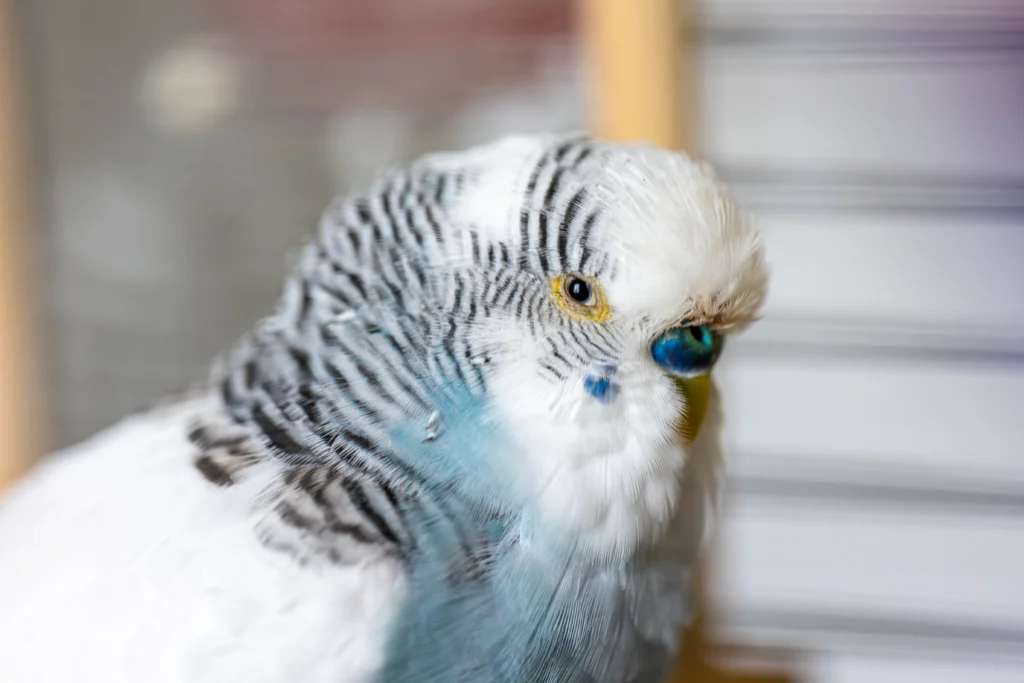
Boredom can significantly reduce your African Grey’s motivation to talk. These intelligent birds need regular mental challenges to stay engaged and communicative.
Rotate toys weekly to maintain interest, providing a mix of puzzles, foraging toys, and items with different textures and sounds. Interactive toys that dispense treats can be particularly effective in keeping your African Grey mentally engaged.
Create opportunities for your bird to observe and interact with diverse environments and people (while maintaining a secure home base). Limited, controlled exposure to new stimuli can encourage curiosity and vocalization.
Teach your African Grey parrot language through interactive play. Games like “name that object” – where you name items before handing them to your bird – reinforce vocabulary in an engaging manner.
5. Be Patient and Realistic
Perhaps most importantly, adjust your expectations to align with your individual bird’s personality and development timeline. Some African Greys naturally talk more than others, regardless of training.
Focus on the quality of interaction rather than the quantity of words your bird learns. A few clearly spoken, contextually appropriate words indicate greater language comprehension than dozens of mumbled phrases.
Remember that African Grey parrot speech development continues throughout their lives. Some birds become increasingly talkative as they age and build confidence in their environment and relationships.
Common African Grey Talking Myths Debunked
As you work to encourage your African Grey’s speech, be aware of common misconceptions that might hinder your progress:
Myth 1: Male African Greys talk better than females. Reality: Both male and female African Greys have equal talking potential. Individual personality and training influence speech more than gender.
Myth 2: A single-bird household produces better talkers. Reality: While competition from other birds can sometimes reduce talking, many African Greys in multi-bird households develop excellent speech. The quality of human interaction matters more than being the only bird.
Myth 3: African Greys automatically learn to talk without training. Reality: Even the best talking African Grey parrots require consistent exposure to human speech and positive reinforcement to develop their vocabulary.
Myth 4: African Greys understand everything they say. Reality: While African Grey parrot language capabilities are impressive, they don’t comprehend all human language concepts. They do, however, often understand context and appropriate usage better than most other talking birds.
Myth 5: Talking African Grey sounds exactly like humans. Reality: While some exceptional birds achieve remarkable clarity, most African Greys retain a slightly “birdy” quality to their speech. This doesn’t diminish their impressive mimicry skills.
Conclusion
If your African Grey parrot isn’t talking, don’t despair. Understanding the four shocking reasons behind their silence – developmental timelines, environmental stress, inadequate training, and health issues – provides you with actionable strategies to encourage vocalization.
Remember that each African Grey parrot’s speech development follows a unique timeline. By creating a secure environment, implementing effective training techniques, ensuring optimal health, and providing mental stimulation, you’ll give your bird the best chance to develop their remarkable talking abilities.
The journey of teaching your African Grey to talk is as rewarding as the destination. The bond you build through patient, consistent training enhances your relationship regardless of how many words your bird ultimately learns.
For more expert advice on parrot care and training, explore our other articles at PetsPump. Our comprehensive guides on African Grey Parrot Care and Bird Training Basics provide additional insights to help you and your feathered friend thrive together.
Additional Resources
For those seeking to further develop their African Grey parrot’s talking abilities, these trusted external resources provide valuable insights and techniques:
- Lafeber Company: African Grey Speech and Language
- World Parrot Trust: African Grey Communication
- Avian Avenue: African Grey Talking Forum
- The Alex Foundation – Research on African Grey cognitive and language abilities
Remember, the talking ability of African Grey parrots is just one aspect of these remarkable birds. Their intelligence, emotional sensitivity, and capacity for companionship make them extraordinary pets whether they develop extensive vocabularies or not.
By addressing the four key factors outlined in this article, you’ll create the optimal conditions for your African Grey parrot talking abilities to flourish, transforming your silent companion into the conversationalist you’ve been hoping for.
This article was researched and written specifically for PetsPump.com and contains expert insights on African Grey parrot talking abilities, training techniques, and troubleshooting advice for owners facing challenges with their birds’ speech development.



